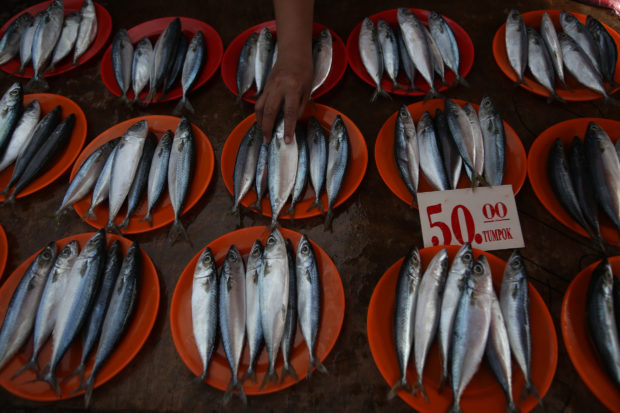
FISHY AND PRICEY Rising fish prices have prompted the government to import “galunggong” (round scad) from three countries. But a fishers’ group believes that the imported fish may have come from Philippine waters. —JOAN BONDOC
It’s akin to a person who lives abroad for a time and comes back home amid much fanfare to enjoy a sumptuous feast laid out by beloved friends and kin.
In this case, the “returnee” becomes a suspect fare on the dining table, according to a fishers’ group.
The Pambansang Lakas ng Kilusang Mamamalakaya ng Pilipinas (Pamalakaya-Pilipinas) again called on the public on Saturday to boycott what it describes as “balikbayan GG,” or imported “galunggong” (round scad), citing their potential health risks to consumers and negative impact on the livelihood of ordinary fisherfolk.
Staging a protest in front of Gate 1 of the Navotas Fish Port Complex, the group sought to stop the entry of 17,000 metric tons of imported galunggong at the complex.
First batch
The fish importation is made possible by Fisheries Administrative Order No. 195 signed recently by Agriculture Secretary Emmanuel Piñol.
The Navotas port is one of the biggest fish markets in the country, as well as Asia, and serves as a marketing hub for local commercial fishing vessels.
On Saturday, in what the Duterte administration cites as a solution to rising fish prices, the first batch of imported galunggong from China, Vietnam and Taiwan arrived at the Navotas port.
But Pamalakaya claimed that it was highly probable the imported galunggong might have been sourced from the country’s seas.
Calling the fish imports “balikbayan GG,” the group said fishing vessels from China and Vietnam might have caught the galunggong in the West Philippine Sea, and those from Taiwan in the Philippine (Benham) Rise.
“They may have entered our local markets, but we will make sure that these imported galunggong will not find their way to ordinary Filipinos’ plates. We will persistently urge the public to boycott these and to patronize instead aquatic and marine products produced by Filipino fishers,” Pamalakaya chair Fernando Hicap said.
The group warned that the agriculture department’s galunggong importation policy would put small municipal fisherfolk at a disadvantage due to price competition.
‘Stale but cheaper’
According to Pamalakaya, imported galunggong, “which are normally stale and frozen but cheaper,” will price local produce out of the market.
Consequently, as the imported variety floods the market, the farm-gate price of “local galunggong,” which ranges from P60-P70 a kilogram, will take a hit, it said.
Pamalakaya earlier described the government’s move to import 17,000 MT of galunggong as a big insult to the Philippines, an archipelagic country with vast and rich aquatic resources.
At the group’s protest action, members distributed leaflets to marketgoers and vendors that contain guidelines in buying fresh galunggong.
The guidelines encourage the public not to patronize imported galunggong, which Pamalakaya said might have been bathed in harmful chemicals such as formalin to increase their shelf life.
Some big fishing companies use formalin, an embalming liquid chemical, as a bath treatment to control external parasitic infections of fish.